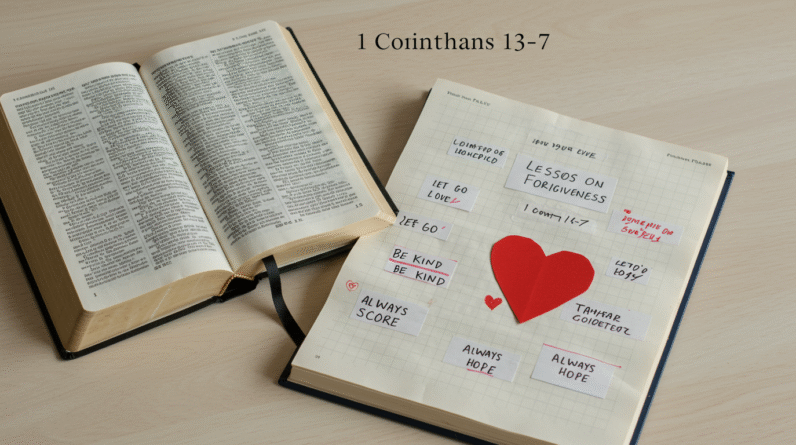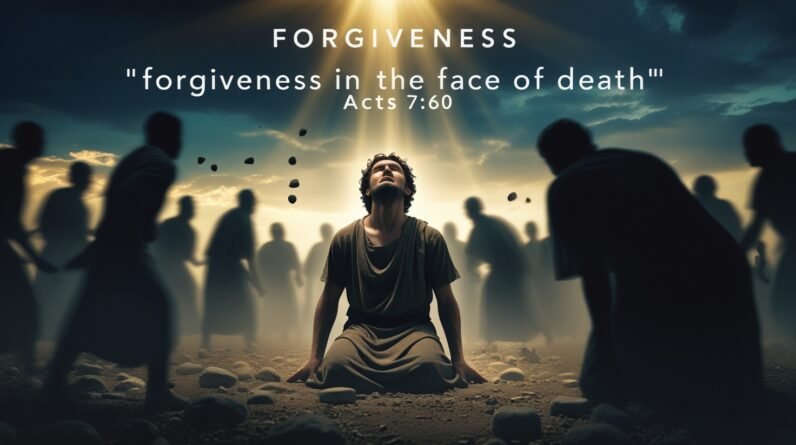Explore the transformative power of forgiveness in Matthew 18:21-22. Discover how boundless mercy can reshape your relationships and lead to healing and reconciliation.
Finding Forgiveness in Matthew 18:21-22
Introduction
We live in a world that often feels overwhelming, and many of us seek wisdom and strength from various sources to navigate our lives. In this pursuit, the Bible stands out as a timeless source of guidance, offering comfort, strength, and profound insight. It provides compass-like direction for many aspects of life. One particularly poignant passage that speaks directly to the heart of human experience is Matthew 18:21-22. This passage, tucked away in the New Testament, offers us invaluable lessons about forgiveness, an element that can transform our lives and relationships. Today, let’s explore these verses and uncover why they are truly verses to live by.
Verse Reference
Matthew 18:21-22 (NIV): “Then Peter came to Jesus and asked, ‘Lord, how many times shall I forgive my brother or sister who sins against me? Up to seven times?’ Jesus answered, ‘I tell you, not seven times, but seventy-seven times.’”
Meaning and Interpretation
When Peter approached Jesus with the question of forgiveness, it was likely a question many of us have pondered at times. “How many times shall I forgive?” he asked. His suggestion of forgiving someone seven times seemed, in his time, a generous estimate. Seven, several completeness and perfection, might have felt like enough. Yet, Jesus’ response—to forgive not just seven times but seventy-seven times—sets the bar much higher. This answer suggests an endless forgiveness that sees beyond human calculations and limitations.
This passage is part of a larger conversation Jesus is having about life in his community of followers, focusing on humility, simplicity, and the relentless pursuit of reconciliation. It serves as a radical call to grace and mercy. In a society where justice and retribution often take precedence, Jesus presents a counter-cultural notion that challenges us to perpetuate forgiveness without counting the costs.
Personal Reflection
Forgiveness, in theory, sounds liberating. However, in practice, it can be difficult to let go of grievances, especially when we feel justified in our hurt. There have been times in my life where I held onto hurt like a badge of honor, not realizing that it silently anchored me to that very moment of pain. Matthew 18:21-22 reminds me that forgiveness is not a one-time act but rather a continual process of releasing bitterness.
In modern life, relationships can be complex, fraught with misunderstandings and disappointments. Yet, this passage invites us to practice boundless forgiveness, which might just change the lens through which we see those around us. Imagine if we treated every encounter with a heart ready to forgive. It is a hope that we can step into with bravery and a willingness to mend and to heal, rather than to scorekeep.

Life Application
So how do you practically live out this teaching in everyday life? Here are a few ways to start incorporating Matthew 18:21-22 into your daily interactions:
- Practice Empathy: Try to see situations from the other person’s perspective, acknowledging their humanity and recognizing their faults, just as you recognize your own.
- Mindful Release: When grievances arise, take a moment to consciously decide to forgive, instead of letting resentment build up. This can involve a literal act, such as writing out feelings and then discarding them as a symbolic gesture of letting go.
- Intentional Reconciliation: Make an effort to reach out and mend relationships, even if it means swallowing pride or admitting fault. Healing in relationships often begins with small steps.
- Accountability Partner: Find someone who shares similar values and can encourage and remind you of your commitment to forgive. We all need those nudges sometimes.
Incorporating these steps can gradually shift your mindset and actions towards living a life that embodies relentless forgiveness, as Jesus articulates.
Closing Thought
Matthew 18:21-22 isn’t just a verse for contemplation; it’s an invitation to transform the way we interact with others. In a world where grudges can dictate narratives, this passage serves as a gentle reminder that there is another way—one marked by mercy and reconciliation. As you engage with people around you, challenge yourself to embolden forgiveness as an active practice, rather than a passive notion. Let these verses guide you towards a more peaceful and empathetic approach to others.
As a ClickBank Affiliate, I earn from qualifying purchases.
Acknowledgment: All Bible verses referenced in this article were accessed via Bible Gateway (or Bible Hub).








